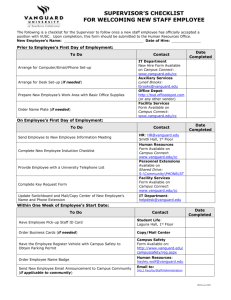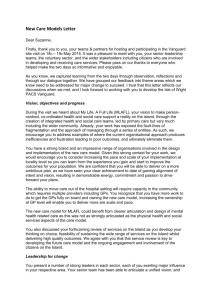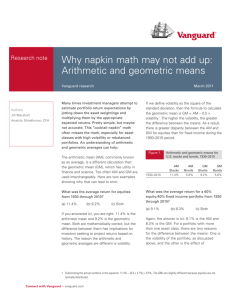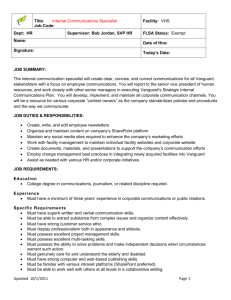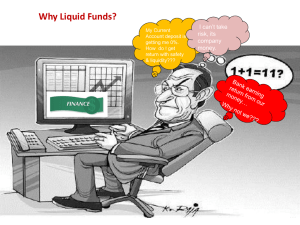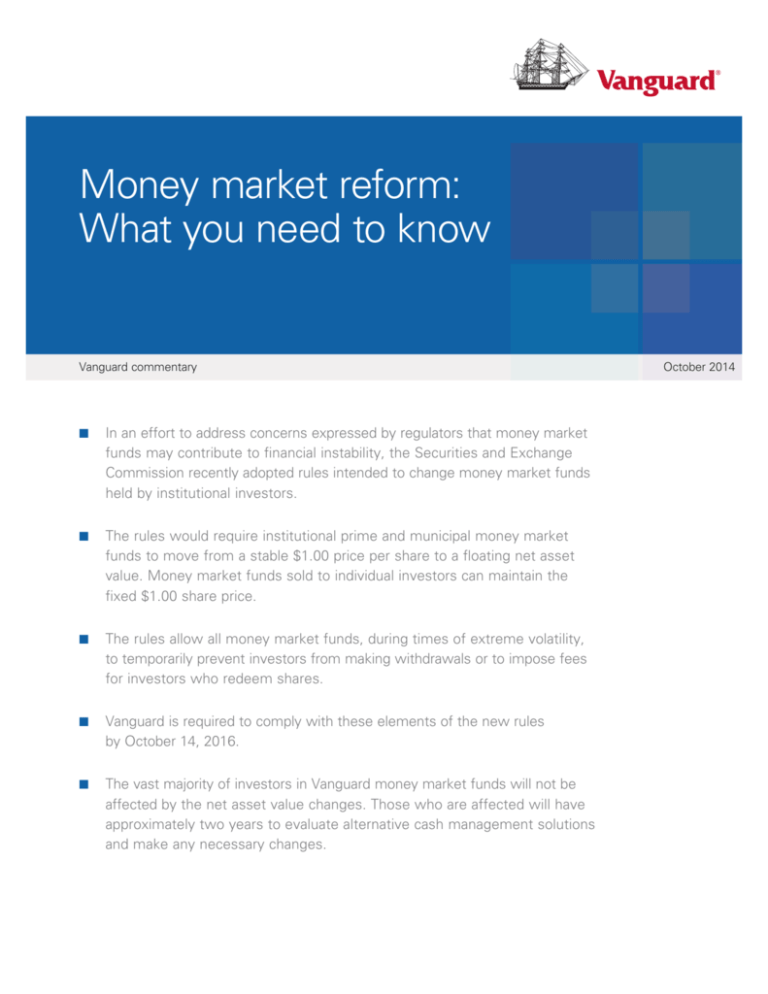
Money market reform:
What you need to know
Vanguard commentary
■■
In an effort to address concerns expressed by regulators that money market
funds may contribute to financial instability, the Securities and Exchange
Commission recently adopted rules intended to change money market funds
held by institutional investors.
■■
The rules would require institutional prime and municipal money market
funds to move from a stable $1.00 price per share to a floating net asset
value. Money market funds sold to individual investors can maintain the
fixed $1.00 share price.
■■
The rules allow all money market funds, during times of extreme volatility,
to temporarily prevent investors from making withdrawals or to impose fees
for investors who redeem shares.
■■
Vanguard is required to comply with these elements of the new rules
by October 14, 2016.
■■
The vast majority of investors in Vanguard money market funds will not be
affected by the net asset value changes. Those who are affected will have
approximately two years to evaluate alternative cash management solutions
and make any necessary changes.
October 2014
A focus on institutional investors
During the financial crisis of 2007–2008, the Reserve
Primary Fund “broke the buck,” meaning its net asset
value (NAV) dropped below $1.00 per share. This event
prompted significant redemptions from institutional prime
money market funds, putting them under severe stress
and leading the U.S. Treasury to create a temporary
guarantee program for money market funds.
Since then, the Securities and Exchange Commission
(SEC) has implemented a number of regulatory changes
designed to enhance the stability and resilience of all
money market funds. In 2010, the SEC issued its first set
of new rules for the funds. These rules included tighter
restrictions on portfolio holdings, enhanced liquidity and
credit quality requirements, and greater transparency.
While these enhancements were favorably received
by money market investors, they failed to address the
concerns exposed by the highly volatile behavior of
institutional investors at the peak of the crisis. During
this period, retail investor activity was more balanced,
with purchases and redemptions largely offsetting each
other. In stark contrast, institutional flows were largely
concentrated and one-way, with redemptions far
exceeding purchases. This behavior placed added
stress on the markets, which the SEC was determined
to resolve with its new rules.
Floating NAVs for some funds
The new regulations make a distinction between
institutional and retail money market funds.
Prime and municipal/tax-exempt money market funds
whose investors are institutions are required to move
from a fixed $1.00 share price to a floating NAV. These
funds will no longer be allowed to use amortized cost
to value portfolio securities. Instead, daily share prices
will be calculated using the market-based value of
portfolio holdings, rounded to the fourth decimal place.
U.S. government money market funds will be permitted
to retain the stable $1.00 per share NAV and may
be offered to institutional investors. In order to be
considered a government fund, a portfolio is required
to invest at least 99.5% of its total assets in cash,
government securities, and/or repurchase agreements
that are collateralized solely by government securities
or cash.
All retail money market funds will also maintain a stable
$1.00 share price. In order to be considered a retail fund,
the fund must have policies and procedures reasonably
designed to limit beneficial ownership to natural persons
(for example, accounts associated with social security
numbers), including individual beneficiaries of certain
trusts and participants in certain tax-deferred accounts,
such as defined contribution plans.
Businesses, defined benefit plans, endowments, and
other accounts that are not beneficially owned by natural
persons will have access only to institutional money
market funds.
There are many instances where retail eligibility is currently
unclear, including, but not limited to, certain pooled
investments holding money market funds, nonqualified
investment plans, collective trust investments and money
market components of company stock funds or other
custom plan funds, retirement plans with forfeiture
accounts and short-term investment funds, and donoradvised funds.
Vanguard is working with our counterparts in the industry,
various industry groups (e.g., Investment Company
Institute), and the SEC to determine the appropriate
categorization for these account types and registrations.
Vanguard is required to comply with the new NAV rules
by October 14, 2016.
Note on risk: All investing is subject to risk, including the possible loss of the money you invest.
An investment in a money market fund is not insured or guaranteed by the Federal Deposit Insurance Corporation or any
other government agency. Although a money market fund seeks to preserve the value of your investment at $1 per share,
it is possible to lose money by investing in such a fund.
2
SEC Regulations for Money Market Mutual Funds
Major changes noted in blue
Retail Funds
Ownership is restricted to individual investors (defined as “natural persons”)
Net Asset Value
Redemption fee
Stable at $1.00
Up to 2%
Prime
Municipal/Tax-Exempt
Redemption suspension
Up to 10
business days
Institutional Funds
Ownership is open to all investors, including individual investors
Net Asset Value
Redemption fee
Floating
Up to 2%
Net Asset Value
Redemption fee
Redemption suspension
Stable at $1.00
None*
None*
Prime
Municipal/Tax-Exempt
Redemption suspension
Up to 10
business days
Retail and Institutional Funds
Government
* Government money market funds are permitted, but not required, to impose redemption fees and restrictions.
Liquidity fees and redemption gates
for institutional and retail funds
The SEC’s amendments also include new rules about
liquidity fees and gates (temporary suspension of
redemptions) allowing a fund’s board of directors to directly
address runs on a fund. If deemed appropriate by the
fund’s board, fees and gates could be imposed on funds
whose portfolios fail to meet certain liquidity thresholds.
The following will apply to both retail and institutional
prime and municipal/tax-exempt money market funds:
• If a fund’s weekly liquid assets fall below 30% of its
total assets, the board may impose a liquidity fee of up
to 2%. Additionally, the board may suspend redemptions
for up to 10 business days in a 90-day period.
• If weekly liquid assets fall below 10% of total assets,
nongovernment funds are required to impose a 1%
liquidity fee, unless the board determines that it would
not be in the fund’s best interest or that a higher (up to
2%) or lower fee is more appropriate.
Although Vanguard has two years to comply with the
liquidity fees and redemption gates rules, we don’t
anticipate much change to our funds. We’ve always
put safety and liquidity ahead of a few extra basis points
in yield. In 2010, we increased the liquidity of our
funds above their customarily high levels. We expect
to be able to manage our funds without fees and gates.
Trigger levels for imposing redemption fees and
restrictions (for funds subject to the new rules)
If a fund’s weekly liquid assets fall below 10%:
• The fund is required to impose a 1% redemption
fee, unless its board determines otherwise (can
range from 0% to 2%).
If a fund’s weekly liquid assets fall below 30%:
• The fund’s board may impose a redemption
fee of up to 2%.
The fund may suspend redemptions for up
to 10 business days in any 90-day period.
U.S. government money market funds are permitted,
but not required, to impose fees and gates.
3
Additional changes
For Vanguard, it’s business as usual
The new amendments contain other notable changes.
These include enhancements to:
Money market funds continue to play an important role
for Vanguard clients, providing a high-quality and liquid
investment, both in stable financial markets and during
periods of uncertainty.
Diversification requirements:
• Adhering to SEC guidelines regarding the extent to
which money market fund holdings can be consolidated
in securities issued by a specific entity or affiliated
group or guaranteed by a specific sponsor or demand
feature provider.
Website disclosure requirements:
• Disclosing daily and weekly liquid assets, net
shareholder inflows or outflows, market-based
NAVs per share, imposition of fees and gates,
and any use of affiliate sponsor support.
Reporting obligations:
• Disclosing certain significant events to the SEC,
such as the imposition of a fee or gate, or if a portfolio
security defaults.
• Amending Form N-MFP with additional information
relevant to assessing money market fund risk.
Stress testing:
• Periodically testing the ability to maintain weekly liquid
assets of at least 10% and minimize principal volatility.
Although the floating NAV, liquidity fees, and redemption
gates will be implemented by the October 2016 deadline,
these other changes will take effect sooner.
We remain confident in the stability of our money market
funds, and we continue to manage the funds conservatively
and with extreme prudence, focusing on the highest-quality
short-term money market instruments.
All of the investments in our money market funds are
closely examined by Vanguard Fixed Income Group’s
highly skilled and experienced credit analysts. The quality
of the underlying issuer is continually assessed through
in-depth credit analysis and does not rely on agency
ratings alone.
We believe that these changes, along with the
safeguards implemented in 2010, constitute a strong
response to concerns that institutional money market
funds may pose a risk to the financial system. While the
majority of Vanguard money market fund shareholders
won’t be affected by the new rules, some institutional
clients will be. Vanguard is in the process of evaluating
the changes and the impact on our shareholders. We’re
confident that we’ll be able to provide a viable cash
management vehicle for all of our shareholders
within the necessary time frame.
Vanguard Research
Connect with Vanguard® > vanguard.com
For more information about Vanguard funds, visit vanguard.com, or call 800-662-2739, to obtain
a prospectus. Investment objectives, risks, charges, expenses, and other important information
about a fund are contained in the prospectus; read and consider it carefully before investing.
P.O. Box 2600
Valley Forge, PA 19482-2600
© 2014 The Vanguard Group, Inc.
All rights reserved.
Vanguard Marketing Corporation, Distributor.
VGMMR 102014


